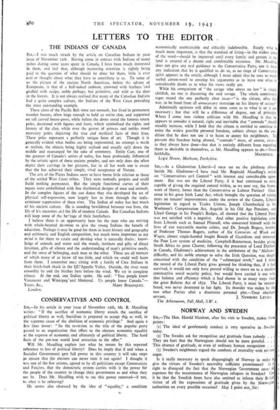CONSERVATIVES AND CONTROL
Sut,—In his article in your issue of November 12th, Mr. R. Maudling writes: "If the sacrifice of economic liberty entails the sacrifice of political liberty as well, Socialism is prepared to accept thi,s as well, in the supreme cause of the abolition of economic privilege." And again a -few lines lower: "So the reversion to the title of the popular party passed to an organisation that offers to the electors economic equality at the expense of economic and ultimately of political liberty. The hard facts of the pre-war world lend attraction to the offer."
Will Mr. Maudling explain just what he means by this repeated reference to loss of political liberty? Does he imply that if and when a Socialist Government gets full power in this country it will take steps jo ensure that the electors can never turn it out again? I thought it was one of the few axioms, agreed to by all politicians except Communists and Fascists, that the democratic system carries with it the power for the people of the country to change their government as and when they see fit. Does Mr. Maudling wish to see this power removed—if not, to what is he referring?
He seems also obsessed by the idea of "equality," a condition
economically unobtainable and ethically indefensible. Surely what is much more important, is that the Standard of living—in the widest sense of the word—should be improved until every family and person in the land is assured of a decent and comfortable existence. Mr. Maudling does not give any real guidance to the Conservative Party, nor is there any indication that he is qualified to do so, as no tinge of Conservative spirit appears in the article, although I must admit that he uses so much verbal cotton-wool to envelop his arguments as to leave one often in considerable doubt as to what his views really are.
While his comparison of "the savage who obeys no law" is simply childish, no one is discussing the said savage. The whole controversy rages round the one perfectly clear issue—" is the citizen, after this war, to be freed from all unnecessary restraints on his liberty of action?"
Admittedly opinions will differ in some cases as to what is or is not necessary ; but that will be a difference of degree, not of principle. Where I come into violent collision with Mr. Maudling is that he
appears to consider it natural, right and inevitable that " controls " should steadily increase, while I hold that the citizen is entitled to continue to enjoy the widest possible personal freedom, subject always to the con- dition that he does not. use it to harm or annoy his neighbours. To prevent this freedom being abused, " controls " must, of course, exist—
as they always have done—but that is entirely different from regarding them as desirable in themselves, as Mr. Maudling appears to do.—Yours


























 Previous page
Previous page